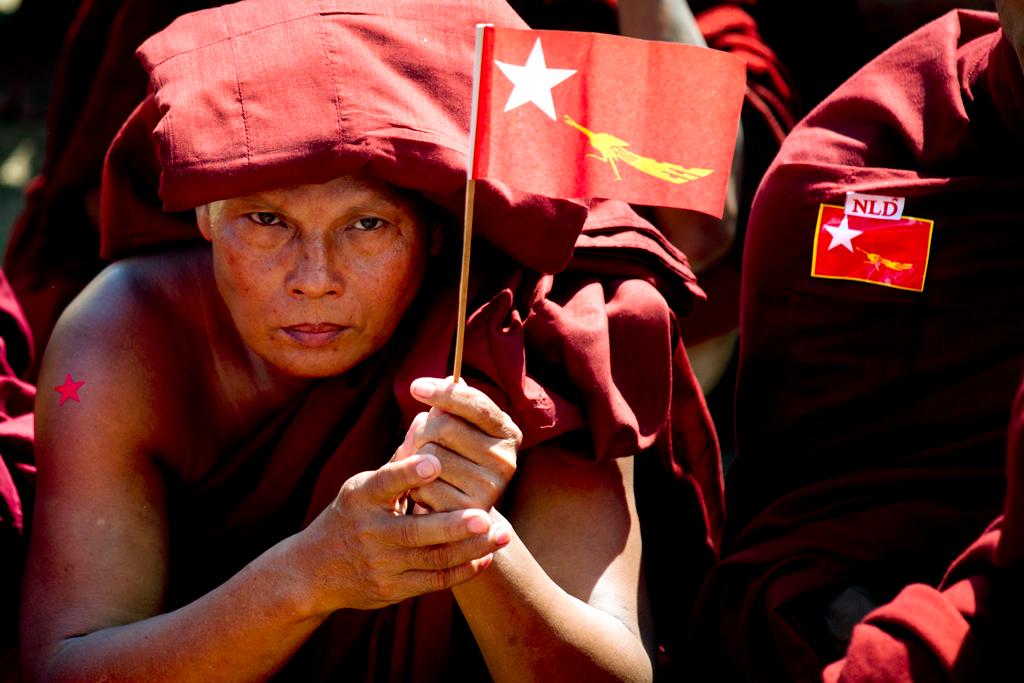Southeast Asian leaders converge on Myanmar for World Economic Forum on East Asia
PATHEIN, MYANMAR – FEBRUARY 7: Burmese monks hold the NLD party flag as they listen to Myanmar opposition leader Aung San Suu Kyi speak during her Delta region campaign trip on February 7, 2012 in Pathein, Myanmar. Aung San Suu Kyi is beginning her election campaign as an official candidate ahead of the April 1 by-elections. This was the first time in twenty years that Suu Kyi has visited the Delta region. (Photo by Paula Bronstein/Getty Images)
BANGKOK, Thailand — Heads of state, business moguls, academics and their entourages are flocking to Myanmar to talk shop in what has fast become Asia's most drooled-over economy.
The World Economic Forum, which brings together powerful figures to discuss pressing issues (and indulge in lots of networking), is holding its East Asia summit in Myanmar's far-flung capital this week.
An isolated pariah state just years ago, and now a quasi-democracy opening its arms to the world, Myanmar is considered one of Asia's most exciting economic frontiers.
GlobalPost in-depth: Myanmar emerges
This is an acknowledgement of the fervor surrounding Myanmar, also known as Burma, a country only recently sealed off to the West by sanctions and fears of deep-set corruption.
But there's also much to discuss. The country is wedged between economic giants China and India and believed to have enormous potential. But it's also beset by a decrepit infrastructure, poverty, power outages, civil war, religious strife and more.
The guests at this week's summit add up to an influential roster: the leaders of both Vietnam and the Philippines, chief executives from PepsiCola, General Electric, India's Tata Motors and Japan's Mitsubishi. Visa Inc. and Chevron are also expected to be among the top attendees.
Myanmar President Thein Sein and pro-democracy politician Aung San Suu Kyi will both take part in the forum.
From June 5 to 7, a record 900 participants from 55 countries will meet in Naypyidaw, a remote but well-equipped city built from scratch in the mid-2000s by the military cabal that had directly ruled Myanmar for decades.
The media of various neighboring states discussed plans by Southeast Asian leaders to push for bilateral cooperation between Myanmar and their countries.
Eleven Myanmar quoted Sushant Palakurthi Rao, the senior director for World Economic Forum, as saying:
"International CEOs will be attending the forum and discussing to find the appropriate business development in Myanmar. The forum will bring better opportunities in short term and long term periods."
The Bangkok Post cited Sushant as saying that "severe income disparity" was a key challenge for Myanmar.
"With a population of 60 million and a median age of 29 years, Myanmar has tremendous economic potential, but this will hinge on rapidly improving infrastructure, the quality of education and access to quality healthcare."
He said years of isolation from the global economy had exacerbated problems in Myanmar, which is one of the poorest countries in the region with roughly 37 percent of its population unemployed and about 26 percent living in poverty.
The forum would also help address such issues as ethnic tension and "land grabbing," Sushant said.
Senior Correspondent Patrick Winn reported from Bangkok. Follow him on Twitter @BKKApologist.
Every day, reporters and producers at The World are hard at work bringing you human-centered news from across the globe. But we can’t do it without you. We need your support to ensure we can continue this work for another year.
Make a gift today, and you’ll help us unlock a matching gift of $67,000!
